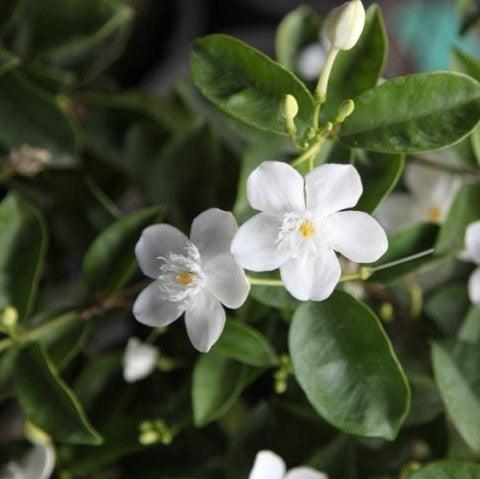-
Plant Description:
- Wrightia antidysenterica is a species of evergreen tree or shrub that is native to India and Southeast Asia. It is commonly known as the "Indian oleander" or "milkwood". It can grow to a height of 15-20 feet, and is prized for its fragrant white or pink flowers. The tree is also known for its medicinal properties, and is used in traditional Ayurvedic medicine to treat a variety of ailments, including dysentery and skin diseases.
-
Growing tips:
- - The tree prefers humid, tropical and subtropical regions.
- Moist and slightly a
Wrightia antidysenterica is a relatively easy plant to care for and can be grown in a wide range of conditions. Here are some general tips for caring for this plant:
-Light: it prefers full sun to partial shade -Soil: it is adaptable to most soils but well-drained, loamy soil is ideal. -Water: it is drought-tolerant and can survive on infrequent watering, but will perform best with regular watering. -Temperature: it is hardy in USDA zones 10-11, but can be grown as a houseplant in other zones. It prefers temperatures between 60-90°F. -Humidity: it prefers high humidity, but can tolerate average household humidity. -Fertilizer: Feed it with balanced liquid fertilizer once in two months during the growing season.
Propagation: Usually propagated by stem cuttings in late spring, which should be allowed to dry for a few days before planting in a well-drained potting mix. Root hormone can also be used to speed up the process.
It is also important to note that Wrightia antidysenterica is toxic if ingested, so care should be taken to keep it out of reach of children and pets.
In general, it is a good idea to prune the plant lightly after it flowers to encourage bushier growth and more flowers in the future.
cidic soil with plenty of humus.
- This is a good tree suitable for small garden and can be planted along roads and paths.
-
Benefits:
- - The tree pref
Wrightia antidysenterica, also known as Indian oleander or milkwood, is known for its medicinal properties. The plant has a long history of traditional use in Ayurvedic medicine, and is used to treat a wide range of ailments. Here are a few examples of the benefits and medicinal uses of this plant:
-
Dysentery: The root bark is used to treat dysentery and diarrhea due to its astringent and antimicrobial properties.
-
Skin diseases: The plant's extract is applied topically to treat various skin conditions like eczema and ringworm.
-
Wound healing: The leaves and bark of the tree have been traditionally used to heal wounds, and are believed to have anti-inflammatory properties.
-
Cancer: There are studies that have explored the anti-cancer properties of Wrightia antidysenterica. Extracts from the leaves and bark have been shown to have anti-tumor effects on human cancer cells in laboratory studies.
-Anti-inflammatory: The leaf extract of the plant has been found to have anti-inflammatory properties, which can help in reducing pain and swelling caused by arthritis and other conditions.
It is important to note that while there is some evidence of the medicinal benefits of Wrightia antidysenterica, more research is needed to fully understand its effects and establish safe and effective dosage guidelines. It is not recommended to use this plant as self-medication.


